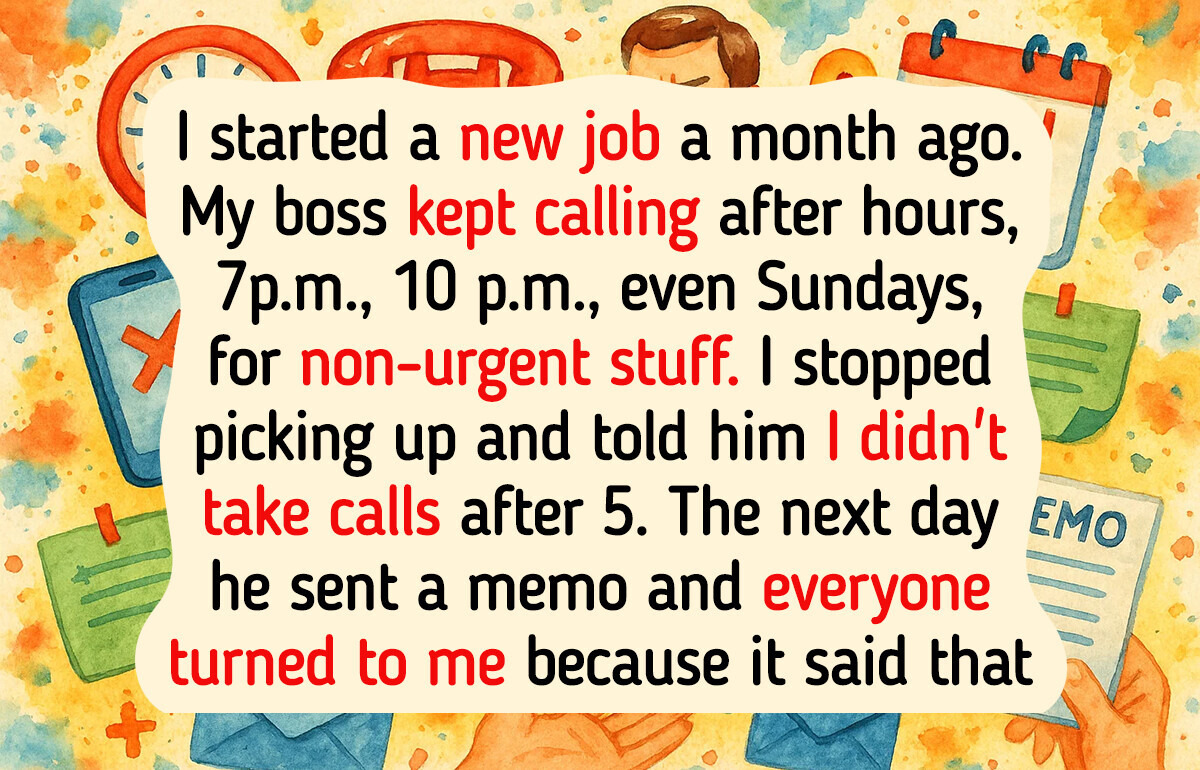
I Refuse to Pick Up Job Calls After Working Hours—but My Boss Found a Way to Shake Up the Rules
It’s not uncommon for us to do whatever it takes to excel in our career. But when the people at our workplace cross the line it could end up affecting our families, And setting boundaries isn’t as easy as it seems. This is exactly what happened with Thomas, and he shared his story with us.
One of our readers, Thomas, reached out.
Dear Bright Side,
I started a new job at a big law firm a month ago. Everything was going well at first, but after the first few days, my boss started getting brave. He started calling me after hours. At first, it was at 7pm then 10pm and once he even called on Sunday. After I answered the first time, Sundays became the norm.
The worst part was that it was always about non-urgent stuff. After about three weeks, I stopped picking up my phone. The next Monday he confronted me about it and I told him that I don’t take call after 5pm and I don’t care if they are urgent or not.
He tried arguing with me, but I reminded him that my contract didn’t mention that I needed to be available while I wasn’t in the office. He just nodded, and I went on with my day, thinking it was settled. I couldn’t have been more wrong.
The next day, he sent a companywide memo. All the laptops pinged at the same time and the next thing I knew everyone was looking at me. I opened the email and the realization was instant. They were all looking at me because it said that there would now be a mandatory on-call rotation.
One person would be assigned each week to take his calls after-hours. It wasn’t long before my colleagues started making remarks and asking questions. But the thing is, I have a newborn and every time he calls he’s waking the baby and that has led to arguments between me and my wife.
It’s not that I don’t want to help him out, but I’m not going to lose my family because he’s lonely. My wife already gave me an ultimatum, she’s asking me to choose between my job and my family. And the truth is that my family will always come first.
So I decided to do the one thing I’ve been avoiding since this started. I sent my resignation to the human resources department. They asked me why, and I told them the truth. That was when things got out of hand.
My boss was called into the office and received his last and final warning. Turns out this wasn’t the first time he was using the company for his own gain. He is known for trying to get people to work after hours. That’s why our specific hours are stated in our contracts.
The next day, he sent another email saying that he made a mistake with his memo. We aren’t allowed to work after hours unless we’re instructed to do so by the human resources department. A month after that, he resigned.
So, Bright Side, am I to blame for all this? Is it my fault that my boss ultimately left his job?
Regards,
Thomas J.
Thank you for reaching out to us, Thomas. We understand how tricky this situation can be so we’ve put together a few tips that might help.
Keep your work and personal life in balance.
It’s a phrase that’s commonly used, but we often ignore it. We think we need to bend over backward in order to keep our jobs, but that simply isn’t true. If you have problems in your workplace, you always need to take a serious look at them and see how they are affecting the rest of your life. The truth is, jobs come and go, but your health and well-being is dependent on you taking care of them.
Make sure you understand everything.
Before you accept a job, make sure you know exactly what is expected of you. If your contract has set hours, you are entitled to ignoring your boss’s calls, no matter how upset he gets about it. You only need to do what is outlined in your contract and if anyone expects you to go out of that scope, it’s your right to deny their request.
Play by your own rules.
It’s so easy for us to be afraid of stepping up in our workplace. We are so dependent on our jobs that we tend to put our own needs aside and do whatever we’re asked to do. But it’s important to remember that we are all humans, and we all make mistakes. That counts for your boss too. So as long as you’re meeting the requirement that are listed in your contract, you’re good to go. The rest of it is a decision you can make all on your own.
Thomas might feel like he’s in the wrong, but it’s not his fault that his boss resigned. That was a decision he made. But Thomas isn’t the only one who has had problems in the workplace.
These people have shared their stories of how their coworkers took workplace drama to a whole new level. If you’d like to see what they experienced, you can read the full story here.





![Ben VanSumeren injury: Eagles fullback out for season [UPDATE]](https://trendsnewsghana.nyc3.digitaloceanspaces.com/uploads/2025/09/06055550/3114284-ben-vansumeren-injury-eagles-fullback-out-for-season-update-150x150.jpg)





